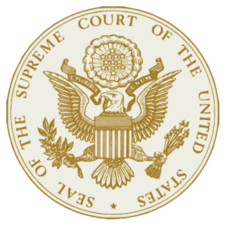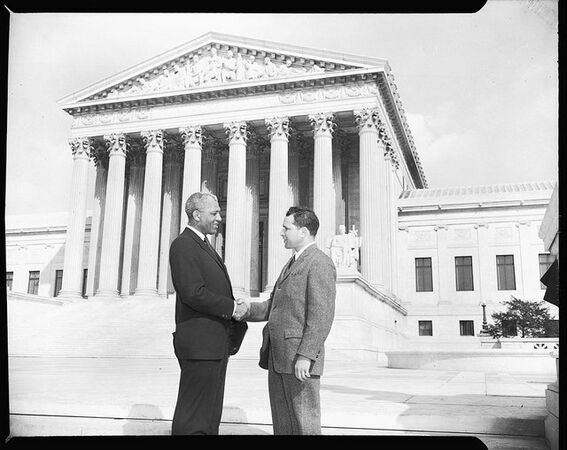Dawson v. Steager
 | |
| Dawson v. Steager | |
| Term: 2018 | |
| Important Dates | |
| Argument: December 3, 2018 Decided: February 20, 2019 | |
| Outcome | |
| West Virginia Supreme Court of Appeals reversed and remanded | |
| Vote | |
| 9-0 | |
| Majority | |
| Chief Justice John G. Roberts • Clarence Thomas • Ruth Bader Ginsburg • Stephen Breyer • Samuel Alito • Sonia Sotomayor • Elena Kagan • Neil Gorsuch • Brett Kavanaugh | |
Dawson v. Steager is a case argued before the Supreme Court of the United States on December 3, 2018, during the court's 2018-2019 term. The case concerned federal retirement benefits and state income taxes.
In a unanimous opinion, the court reversed and remanded the opinion of the West Virginia Supreme Court of Appeals, holding that "the West Virginia statute unlawfully discriminates against Mr. Dawson as §111 forbids. A State violates §111 when it treats retired state employees more favorably than retired federal employees and no 'significant differences between the two classes' justify the differential treatment."[1][2]
You can review the lower court's opinion here.[4]
Timeline
The following timeline details key events in this case:
- February 20, 2019: U.S. Supreme Court reversed and remanded West Virginia Supreme Court of Appeals' ruling
- December 3, 2018: Oral argument
- June 25, 2018: U.S. Supreme Court agreed to hear case
- September 19, 2017: Petition filed with U.S. Supreme Court
- May 17, 2017: West Virginia Supreme Court of Appeals reversed a lower court's ruling
Background
James Dawson retired from the U.S. Marshal Service in 2008. Section 12(c)(6) of the West Virginia code allows some state and local retired law enforcement officers to exempt their retirement benefits from the state income tax. Dawson, receiving benefits from the Federal Employee Retirement System, sought to similarly exempt his retirement income from the state income tax. The tax commissioner denied the exemption.
Dawson argued that the state's refusal to allow federal marshalls the exemption provided in Section 12(c)(6) was illegal in view of 4 U.S.C. § 111. This federal law allows states to tax federal retirement benefits only "if the taxation does not discriminate . . . because of the source of the pay or compensation."[4] Since there is not a significant difference between the duties of state, local, and federal law enforcement officers, he contended, he was being discriminated against on the basis of the source of the compensation. Dawson appealed to the Office of Tax Appeals, which ruled in favor of the tax commissioner.
Upon appeal, the Circuit Court of Mercer County ruled in favor of Dawson. The tax commissioner appealed that decision, arguing that Section 12(c)(6) was not intended to discriminate against retired federal employees. The West Virginia Supreme Court of Appeals reversed the lower court's decision, ruling that the state's tax on Dawson's retirement income was not in conflict with U.S. law.[5]
The state supreme court of appeals' decision read, in part, "The total structure of West Virginia’s system for taxing personal income does not discriminate against retired members of the United States Marshals Service in violation of 4 U.S.C. § 111. Section 12(c)(6) gives a benefit to a very narrow class of former state and local employees, and that benefit was not intended to discriminate against former federal marshals."[4]
Dawson appealed to the U.S. Supreme Court, which agreed to hear the case on June 25, 2018.
Question presented
The petitioner presented the following question to the court:[3]
Question presented:
|
Audio
- Audio of oral argument:[6]
Transcript
- Read the oral argument transcript here.
Outcome
Decision
Justice Neil Gorsuch delivered the unanimous opinion of the court. The court reversed and remanded the opinion of the West Virginia Supreme Court of Appeals, holding that "the West Virginia statute unlawfully discriminates against Mr. Dawson as §111 forbids. A State violates §111 when it treats retired state employees more favorably than retired federal employees and no 'significant differences between the two classes' justify the differential treatment."[2]
Opinion
In his opinion for the court, Justice Gorsuch wrote,
| “ | A State violates §111 when it treats retired state employees more favorably than retired federal employees and no 'significant differences between the two classes' justify the differential treatment. Davis, 489 U. S., at 814–816 (1989) (internal quotation marks omitted); Phillips Chemical Co., 361 U. S., at 383. Here, West Virginia expressly affords state law enforcement retirees a tax benefit that federal retirees cannot receive. And before us everyone accepts the trial court’s factual finding that there aren’t any 'significant differences' between Mr. Dawson’s former job responsibilities and those of the tax-exempt state law enforcement retirees. Given all this, we have little difficulty concluding that West Virginia’s law unlawfully 'discriminate[s]' against Mr. Dawson 'because of the source of [his] pay or compensation,' just as §111 forbids.[7] | ” |
Text of the opinion
- Read the full opinion here.
See also
External links
- U.S. Supreme Court docket file - Dawson v. Steager (petitions, motions, briefs, opinions, and attorneys)
- SCOTUSblog case file for Dawson v. Steager
Footnotes
- ↑ Supreme Court of the United States, "17-419 Dawson v. Steager," accessed November 2, 2018
- ↑ 2.0 2.1 2.2 2.3 United States Supreme Court, "Dawson v. Steager," Opinion, February 20, 2019
- ↑ 3.0 3.1 Supreme Court of the United States, "QPReport 17-419 Dawson v. Steager," accessed November 2, 2018
- ↑ 4.0 4.1 4.2 SCOTUSblog, "Dawson v. Steager," accessed November 2, 2018
- ↑ Oyez, "Dawson v. Steager," accessed November 2, 2018
- ↑ Supreme Court of the United States, Dawson v. Steager, argued December 3, 2018
- ↑ Note: This text is quoted verbatim from the original source. Any inconsistencies are attributable to the original source.
| |||||||||||












